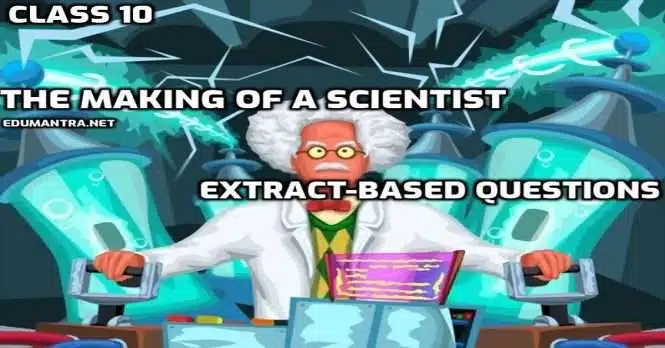
The Making of a Scientist Extract-Based Questions are written by experts. Go through and gain confidence. We at edumantra highly appreciate your feedback regarding The Making of Scientist Class 10 Word Meaning.
The Making of a Scientist Extract-Based Questions
By– Robert W. Peterson
Read the strafes given below enema and answer the questions that follow:
1. So he wrote to Dr Urquhart for ideas. and back Cattle a stack of suggestions for experiments, The kept Bright busy all lining high school and led to prize projects in the county and inter atonal science taws, tail man ass or, Newt’s response.
(a) What happened ‘‘ Ebright acted up the ‘ideas”?
(b) Why did Bright wine to Dr Urquhart?
(c)Mat initiated Bright in the field at’ scientific research?
Ans. (a) Dr Urquhart responded with a stack of suggestions for experiments.
(b) Dwight was kept busy all through high school by the ideas and was led to prize projects in the county and international science fairs.
(c) He wite for scientific ideas.
(d) Dr A. Urquhart had invited his readers to help him study the migration of monarch butterflies; Bright started tagging the butterflies and thus started his first step in the fields.
2. Eventually, I began to lose interest in tagging butterflies. It’s tedious and there’s not much feedback,’ Bright said. -In all the time I did it,” he laughed, “only two butterflies I had tagged were recaptured-and they were not more than seventy-five miles from where I lived.
(a)’ Why did Bright lose interest?
(b) Explain the phrase. ‘they were not seventy-five miles’.
(c) Who was Richard Bright?
(d) What theory was given by him to the scientific world?
Ans. (a) Bright lost interest because it was a tedious job with less feedback.
(b) The phrase is used ironically as Ebright had read about the migration of butterflies to central America and here they did not go far beyond seventy-five miles. So they could not migrate to central America.
(c) He was a great scientist.
(d) He gave his new theory about cell life.
3. Ebright has these qualities. From the time the book. The Travels of Monarch X opened the world of science to him. Richard Ebright has never lost his scientific curiosity.
(a) Which qualities does Ebright have?
(b) Who gave him ‘The Travels of Monarch X’?
(c) How did a book become a turning point in Albright’s life?
(d) How did Ebright come in contact with Dr Urquhart?
Ans. (a) Ebright was competitive with a first-rate mind, added with curiosity, mixed with the will to win for the right reason.
(b) His mother gave him the book.
(c) Due to the book ‘The Travels of Monarch X’, he could communicate with Dr Urquhart who guided and motivated him to initiate scientific research on butterflies.
(d) This happened through the book, ‘The Travels of’ Monarch X’.
4. Beginning in kindergarten, Ebright collected butterflies with the same determination that has marked all his activities. He also collected rocks, fossils and coins. He became an eager astronomer, too, sometimes star-gazing all night.
(a) What was Ebright’s lionizing in kindergarten’?
(b) What was Ebright’s approach towards the activity?
(c) What did Ebright like to do as a child?
(d) Do you think Ebright became an eager astronomer too?
Ans. (a) Beginning in kindergarten he used to collect butterflies, rocks.
(b) His approach towards the activity one of determination.
(c) He was interested in lea riling new snide: rocks’ fossils and coins.
(d) Sometimes, he gazed at the stars throughout the night.
5.by the time he was in second grade, Ebright had collected all twenty-five species of butterflies found around his hometown!’
(a) How many species of butterflies had Ebright collected?
(b) Who is the person who kept Ebright engaged in learning things?
(c) Who is the speaker talking about?
(d) How did Ebright’s mother help him?
Ans. (a) Twenty-five species.
(b) His mother.
(c) Richard Ebright
(d) His mother took him on trips, bought him telescopes, microscopes, cameras, etc. and helped him in many other ways. Every evening both worked together at the dining room table.
6. So the more they look like monarchs, the less likely they are to become a bird’s dinner.
(a) Who are ‘they’ referred to here?
(b) Why are they less likely to become a bird’s dinner?
(c) What was the objective of Ebright’s science fair project?
(d) Why do you think a visit to a science fair helped. Richard to become a great scientist?
Ans. (a) The viceroy butterflies are referred to here.
(b) Viceroy butterflies copy the monarchs, as monarchs apparently do not taste good to birds.
(c) Ebright’s project was to see whether, in fact, birds would eat monarchs.
(d) In the science fair, he realized that to win he should do a real experiment. He resolved to do it next time. This was his initiation to become a great scientist.
Want to Read More Check Below:-

The Making of a Scientist- Multiple Choice Questions in Quiz